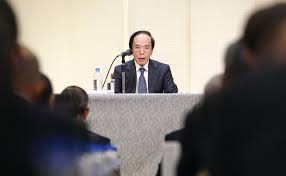Loading
Search
▼ Bank Of Japan Chief Signals Further Rate Hikes To Prevent Sharp Inflation
- Category:Other
Bank of Japan Governor Kazuo Ueda underscored Monday that raising interest rates would be essential to prevent sharp inflation and ensure long-term economic growth, in remarks that could fuel market expectations the central bank is close to another rate hike.
The BOJ will continue to raise its policy rate if the economy and prices move in line with expectations, Ueda said in a speech, adding it is also closely monitoring the weakening yen. The Japanese currency has been under pressure after Donald Trump's victory in the U.S. presidential election triggered a rally in the dollar.
His remarks came amid speculation that the bank may lift borrowing costs as early as December, although Ueda said the BOJ will make policy decisions at each meeting based on its latest assessment and outlook for economic and price activities.
"I think that gradually adjusting the degree of accommodation in line with the improvement in economic activity and prices will support long-term economic growth and contribute to achieving the price stability target in a sustainable and stable manner," he told business leaders in the central Japan city of Nagoya.
If such adjustments are not made, inflation could possibly accelerate rapidly at some point in the future and force the BOJ to raise interest rates sharply, Ueda warned at a press conference later in the day.
On the timing of further increasing the policy rate from the current level of around 0.25 percent, Ueda said the bank also needs to carefully monitor the U.S. and other overseas economies.
The governor pointed out that it has become more likely that the U.S. economy will achieve a soft landing given recent solid economic data, but also noted the possibility of "a resurgence of inflation" as a result of future economic developments and policy conduct.
The U.S. dollar has been strengthening against the yen recently amid speculation that policies proposed by Trump would increase inflation and keep interest rates elevated.
At the press conference, the BOJ chief admitted the yen's depreciation has negatively impacted households and some companies and said the central bank has been paying close attention to economic factors influencing foreign exchange movements.
On domestic economic indicators, the governor said he has seen "some progress," pointing out wages are rising as companies are passing on increased labor costs via higher service prices.
Ueda said that underlying inflation, excluding short-term fluctuations such as a rise in import prices, still remains below the bank's goal of 2 percent, but it is expected to continue to rise gradually, helped by a rise in wages.
"Inflationary pressure stemming from wage increases is projected to strengthen as an improvement in economic activity and solid growth in wages continue," he said in the meeting with local business leaders.
The BOJ ended its negative rate policy in March with the first rate hike in 17 years, followed by another increase in July. It kept its policy rate unchanged at the September and October meetings.
The BOJ expects prices to rise 2.5 percent for the current fiscal year ending March and 1.9 percent for fiscal 2025 and 2026, below the bank's price stability goal of 2 percent, according to its latest outlook on economy and prices released in October.
- November 18, 2024
- Comment (0)
- Trackback(0)


